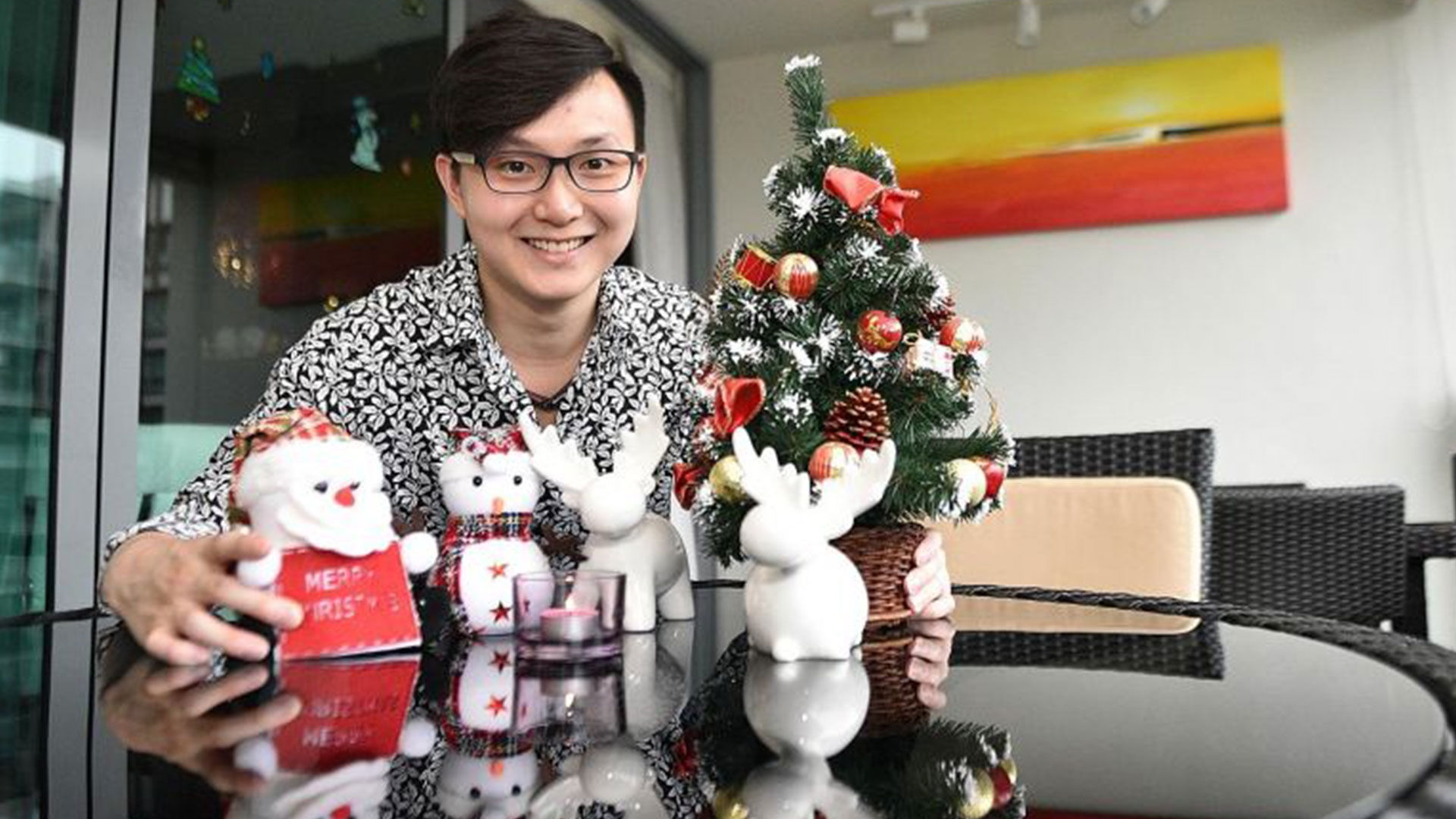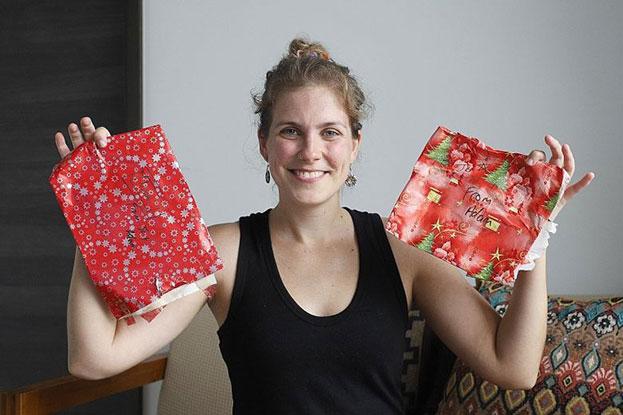
Law undergraduate Alden Tan encouraged his family to stop using wrapping paper for Christmas presents about three years ago. ST PHOTO: KELLY HUI
From bringing your own cutlery to parties to recycling wrapping paper, here are some ways to be eco-friendly this festive season
On the rare occasions that Ms Naomi Clark-Shen gives out presents during Christmas, she uses wrapping paper that is more than 15 years old.
Her father, a teacher in his 60s, used to carefully peel the Sellotape off the family's presents to preserve the paper.
"He felt it was wasteful to use something once and not use it again," recalls Ms Clark-Shen.
Born and raised in Singapore, she has about 40 pieces of old wrapping paper from her childhood.
Uncomfortable with the excessive consumerism that is typically on display at Christmas, she and her family decided, a few years back, to cut back and conserve resources during the festive season.
"A lot of times at Christmas, we buy things we don't need or we give people things they don't want. If consumerism stopped, it would do more for the environment than if people stopped using straws, for instance," says Ms Clark-Shen, a conservationist who works on freelance projects.
Instead of giving physical presents at Christmas, she makes it a point to spend time with her parents, who also live in Singapore. Her elder brother lives in New Zealand.
She sometimes gives experiential gifts, such as a spa session for her mother, a tutor in her 60s.
Ms Clark-Shen and her husband, who works in a technology firm, usually donate to charity - to environmental, humanitarian and animal-welfare causes - at Christmas. The couple, both 28, do not have children.

Ms Naomi Clark-Shen has about 40 pieces of old wrapping paper from her childhood. ST PHOTO: MARCELLIN LOPEZ
Eating, drinking, merry-making and buying and receiving presents can easily tip over into over-consumption and wastage during the festive season.
But having an eco-friendly Christmas - whether by recycling or eschewing wrapping paper, forgoing gifts or having more vegetarian festive meals - may not be as challenging as one might expect.
Having environmental-friendly habits makes it easier to do so.
"I think you have to believe in the cause, otherwise it can feel like a chore or a hassle. I feel happier not buying and consuming so much at Christmas," says Ms Clark-Shen, who has been vegetarian since she was 11.
Eating a more plant-based diet while reducing consumption of animal products is better for the environment because livestock production is a key contributor to greenhouse-gas emissions that contribute to global warming, experts say.
She also pays for carbon offsets for reforestation and other green programmes when she takes flights.
Individuals and businesses can buy carbon offsets to fund projects that reduce greenhouse-gas emissions, which contribute to global warming. This reduces the carbon footprint for activities such as air travel and driving.
Even if one leads a less eco-conscious lifestyle than Ms Clark-Shen, there is value in taking baby steps towards a sustainable celebration, environmental activists say.
Environmental groups suggest approaching Christmas mindfully.
Mr Ong Chun Yeow, a representative of the non-profit organisation Ground-Up Initiative, which aims to model a Singapore society with a sustainable future, says eco-friendly choices are available at every step of the way - before and during Christmas.
These range from shopping at zero-waste grocers that encourage shoppers to take along their own jars and bags to hold the produce to using reusable snack bags and "encouraging a bring-your-own culture" at parties, where guests can take along their own cutlery instead of using disposable ones, he says.
Mr Ong says: "During festive seasons, peer pressure is a factor. People feel they need to reciprocate in giving presents, for example. The question is, 'How can I slowly change, with little actions?'"
Ms Teresa Teo Guttensohn, president and co-founder of Cicada Tree Eco-Place, which offers environmental education, says: "Even a small decision, such as making sure there's no food wastage or giving presents with no plastic in them, makes a difference.
"Don't worry if you cannot make changes all at once as long as you put some thought into how you can be more eco-friendly."
The 56-year-old knows first-hand the experience of balancing the pressures of having a traditional Christmas with adhering to values of sustainability.
Her Austrian husband and their two children aged 31 and 23 have had a real Christmas tree since they were kids. It is a tradition from their childhood their family has kept, even though Ms Teo Guttensohn, who works in the sports industry, had qualms about the environmental impact of doing so.
Still, she has compensated by recycling the Christmas decorations and their tree does not have artificial lights.
Instead, they fasten candles to the tree, lighting them on Christmas Eve and Christmas Day for a few minutes. A bucket of water is on hand, in case of emergencies.
She reuses boxes, especially Mid-Autumn Festival ones used to contain mooncakes, to pack presents and their Christmas meals have become more plant-based.
For Mr Alden Tan, 23, a law undergraduate, becoming more environmentally aware from studying geography in his school days has prompted him to encourage his family to be more eco-friendly during Christmas.
About three years ago, the bachelor asked his family not to use wrapping paper for their presents. Their household also stopped using disposable cutlery when hosting Christmas parties.
"It's not challenging for me to have an eco-Christmas," says Mr Tan.
"Christmas is a season of giving and we can give back to the environment through environmentally friendly practices."
HOW TO HAVE A SUSTAINABLE CHRISTMAS: 5 TIPS
RENT A CHRISTMAS TREE
Renting a Christmas tree is an alternative to putting up an artificial one made of plastic or using real pine trees, which are cut down. Air-conditioned facilities are typically used to keep real pine imports "fresh", which add to the carbon footprint. Try places such as Wan Yuan Gift International to rent a Christmas tree.
DO-IT-YOURSELF CHRISTMAS ORNAMENTS
Teach children to reuse and recycle their old toys and plushies as decorations. You can even make your own Christmas "tree" with used bottles and cans.
Use energy-efficient LED lights instead of traditional light bulbs.
NO-TAPE WRAPPING
Reuse old scarves to wrap and tie gifts, which eliminates the use of sticky tape as well.
WWF Singapore has an ongoing Rewrap Project, in which your gifts can be wrapped using old newspapers and paper certified as sustainable by the Forest Stewardship Council.
This helps to minimise deforestation and reduces paper wastage. This roadshow is held at malls and other locations this month.
REGIFTING
With a little creativity, consider regifting presents instead of throwing them away. Gifting experiences instead of presents, such as a family day out, promotes bonding.
Give fewer plastic products. Alternatives are wooden utensils, canvas tote bags and organic soap.
ZERO-WASTE PARTIES
Avoid over-ordering and portion just enough for the party. Prepare dishes that can be kept for a few days, such as roasted meat and potatoes, rather than leafy greens.
Consider more plant-based food, such as dishes made with genetically modified soya, instead of turkey and ham, as well as opting for sustainably sourced seafood.
Redistribute unused food and produce by working with organisations such as Treedots, Treatsure and SG Food Rescue.
Promote reusable cutlery for dining and encourage guests to use public transport.
Information provided by Ms Janissa Ng, WWF-Singapore's senior manager for content and engagement
This content is in partnership with ST Life
Read more about regifting ideas.